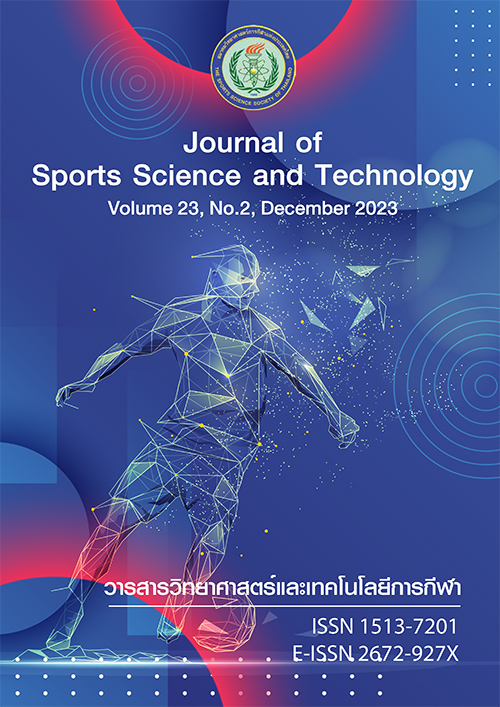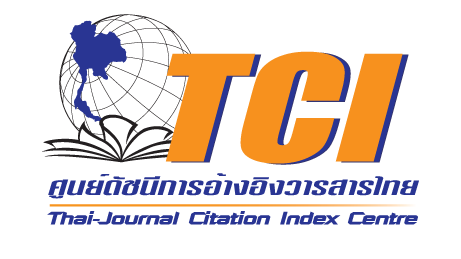EFFECTS OF COMPLEX TRAINING WITH A SHUTTLE RUN ON ACCELERATION AND REPEATED SPRINT ABILITY OF VARSITY FOOTBALL PLAYERS
DOI:
https://doi.org/10.14456/jsst.2023.9Keywords:
Football players, Acceleration, Complex Training, Repeated Sprint AbilityAbstract
The purpose of this study was to investigate the effects of complex training with a shuttle run on acceleration and repeated sprint ability in varsity football players. Thirty varsity male football players (aged 18-22 years) were recruited from Mahidol University and equally allocated into 3 groups; a control group, an experimental group1 (complex training with a 20-meter shuttle run) and an experimental group2 (traditional complex training). All participants performed the training program 3 days weekly for 6 weeks. Acceleration at 10-meters, 15-meters, and 30-meters and repeated sprint ability (RSA) were tested before and after training. The results revealed that the acceleration at 15-meters and 30-meters and RSA of experimental group 1 were significantly improved after training compared to control group (p<0.05). However, non-significant different of acceleration at 15-meter and 30-meter and RSA were found between experimental group 1 and 2, with the percent changes of experimental group 1 showed a better tend of improvement compared with experimental group 2. In conclusion, the combination of complex training with a shuttle run is more efficient program for sprint performance improvement. Therefore, this training regimen can be used as a supplementary program for preparing athletes’ readiness especially during the in-season period in football players.
(Journal of Sports Science and Technology 2023; 23(2):33-45)
(Received: 29 May 2023, Revised: 31 August 2023, Accepted: 4 September 2023)
*Corresponding author: Arom TREERAJ
College of Sports Science and Technology, Mahidol University,
Nakhon Pathom,Thailand, 73170,THAILAND
E-mail: treeraj@hotmail.com
References
Tomas S., Karim C., Carlo C., Ulrik W. Physiology of soccer. Sport Med. 2005.35(6):501-536.
Sanchez J.S., Campillo R.R., Petisco C., Hernandez D., Nakamura F.Y. Effect of short-term strength and jumping exercises distribution on soccer player’s physical fitness. Kinesiology.2021.53(2);236-244
Marques, M.C., Gabbett T.J., Marinho D.A. Blazevich A.J. Sousa A., van den Tillaar R., Izquierdo M. Influence of strength, sprint, running, and combined strength and sprint running on short sprint performance in young adults. Int Sport Med.2015.36(10),789-795
Krabuanrat. C. Hand out Sports Science for Football. Sports authority of Thailand. New thaimitrkarnpim.
Bangkok.2003. 460 p
Chtara M. Specific physical trainability in elite young soccer players: efficiency over 6 weeks’ in-season training. Biology of Sport, 2017.137-148.
Sander A. Influence of a 2-year strength training programme on power performance in elite youth soccer players.Eur J Sport Sci., 2013.1-7.
Jalilvand F. Development of biomotor abilities for soccer.InFarzad Jalilvand,NSCA COACH. 2016.2.1 (12-16).
Chu, D.A. Explosive power and strength. Champaign, IL: Human Kinetics.USA.1996. 192 pp.
Thapa RK, Lum D, Moran J, Ramirez-Campillo R. Effects of complex training on sprint, jump, and change of direction ability of soccer players: A systematic review and meta-analysis. Front Psychol. 2021.22;11:627869.
Maio Alves JMV,Rebelo AN, Abrantes C.,Sampaio J . Short-term effects of complex and contrast training in soccer players’ vertical jump, sprint, and agility abilities. J Stre Cond Res,2010, 24(4). 936-941.
Kamutsri T., Treeraj A., Chareonphon O., Choodam S., Hasup W., Somwang N. A development of physical fitness norms in thai university athletes. J Sport Sci Tech. Vol.19.N0.1 July, 2019.
Crum, A.J., Kawamori, N., Stone, M.H., & Haff, G.G. The acute effects of moderately loaded concentric-only quarter squats on vertical jump performance. J Stre Cond Res. 2012.22(3). 726-730 13. Treeraj A., Kamutsri T. Effect of weight training on hamstrings to quadriceps peak torque ratio in thai female national volleyball players. J Sports Sci Tech. 2020. 20(2) : 40-53
Rahimi E., and Behpur N. The effects of plyometric, weight and plyometric-weight training on anaerobic power and muscular strength. Phy Edu and Sport J. 2005.3(1): 81-91.
Matthews MJ, Comfort P, Crebin R. Complex training in ice hockey: the effects of a heavy resisted sprint on subsequent ice-hockey sprint performance. J Strength Cond Res. 2010.24(11):2883-7.
Comyns, T., Harrison, A., and Hennessy, L. Effect of squatting on sprinting performance and repeated
exposure to complex training in male rugby players. J Stre Cond Res. 2010. 24(3):p 610-618.
Irneu Loturco, Nakamura F.Y., Kobal R. and Gil S. Traditional periodization versus optimal training load
applied to soccer players; Effects on neuromuscular abilities. Int J Sports Med. 2014. 37(13)
Lagrange S. The optimal time window for complex training in order to increase repeated sprint ability in professional ice hockey players. International Journal of Strength and Conditioning. 2022 1;2(1).
Bishop D., Girard O., Mendez-Villanueva A. Repeated-sprint ability - part II: recommendations for training. Sport Med. 2011.41(9):741-56.
Gabriel J.S., Zachary T , Brian B. , Coreya P., Willard P., Alar L. Aerobic capacity is related to repeated sprint ability with sprint distances less than 40 meters. Int J Exer Sci. 2017. 10(2): 197-204







